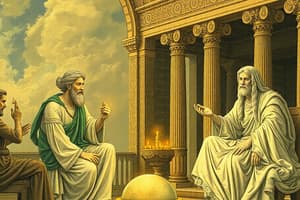Podcast
Questions and Answers
Match the following accusations against Socrates with the reasons for them:
Match the following accusations against Socrates with the reasons for them:
Impiety = Belief in different gods Corrupting the youth = Influence on the younger generation Disbelief in the gods = Challenging traditional beliefs Unconventional way of life = Living differently from societal norms
Match the following descriptions with the correct event or concept related to Socrates:
Match the following descriptions with the correct event or concept related to Socrates:
Socratic method = Method of questioning to stimulate critical thinking Socrates vs Sophists = Debate about authentic wisdom and knowledge Accusations against Socrates = Charges of impiety, corrupting the youth, disbelief in gods Trial of Socrates = Legal proceedings leading to his death sentence
Match the following terms with their relevance to Socrates' legacy:
Match the following terms with their relevance to Socrates' legacy:
Oracle of Delphi = Prophetic advice that led to Socrates' self-awareness Philosophical integrity = Socrates' commitment to truth and moral principles Personal conviction = Socrates' adherence to his beliefs despite societal pressure Societal expectations = Traditional values challenged by Socrates
Match the following actions with their significance in Socrates' life:
Match the following actions with their significance in Socrates' life:
Match the following with their descriptions:
Match the following with their descriptions:
Match the following with their roles:
Match the following with their roles:
Match the following with their functions:
Match the following with their functions:
Match the following with their significance:
Match the following with their significance:
Match the following with their outcomes:
Match the following with their outcomes:
Match the following with their contexts:
Match the following with their contexts:
Flashcards are hidden until you start studying
Study Notes
Exploring Socrates' Philosophy: The Socratic Method, Sophists, Accusations, and Trial
In the vibrant intellectual landscape of ancient Greece, Socrates emerged as a pivotal figure in philosophical discourse, leaving an indelible mark with his unique approach to inquiry. To fully appreciate the significance of Socrates' philosophy, let's delve into four distinct aspects: the Socratic method, his contrast with Sophists, the accusations against him, and his tragic end at the Trial of Socrates.
The Socratic Method
At the heart of Socrates' philosophy lies the Socratic method—an elenctic dialogue technique that aims to uncover conflicting beliefs and assumptions within an interlocutor's mind. Socrates, known as the "gadfly of Athens," would pose probing questions to challenge cherished notions, thereby revealing gaps in the person's understanding.
Socratic method questions typically follow the form of:
- What do you mean by X?
- Do you think X is true?
- How do you know that X is true?
- Is X true in all cases?
- Is there anything that is not X?
These types of questions, when skillfully employed, can expose the intricacies of an idea, revealing the roots of its tenability.
Socrates vs Sophists
A key contrast in Socrates' philosophical context is drawn with the Sophists—professional teachers who emphasized eloquence and human cunning as the primary means to achieve success. In contrast, Socrates maintained that true virtue and wisdom were attainable only through self-knowledge and an examination of one's beliefs. Socrates believed that the Sophists were teaching an artificial way of being that lacked substance and authenticity.
Accusations against Socrates
Despite his commitment to truth and self-improvement, Socrates was accused of impiety, corrupting the youth, and disbelief in the gods. These charges were not a result of his philosophical inquiries but rather a response to his unconventional way of life and criticism of traditional Athenian values.
Trial of Socrates
In 399 BCE, Socrates was brought before the Athenian Council to stand trial on the charges against him. Though acquitted of impiety, he was found guilty of corrupting the young. Sentenced to death, Socrates refused to flee and chose to drink hemlock, the traditional method of execution at the time, in a defiant act of philosophical integrity.
Socrates' legacy endures to this day, not only for the Socratic method and his philosophical contributions but also for his unwavering commitment to truth, integrity, and self-examination. His trial remains a poignant reminder of the tensions between personal conviction and societal expectations. By exploring Socrates' philosophy, we can gain valuable insights into the complexities of human existence and the pursuit of knowledge.
Studying That Suits You
Use AI to generate personalized quizzes and flashcards to suit your learning preferences.




